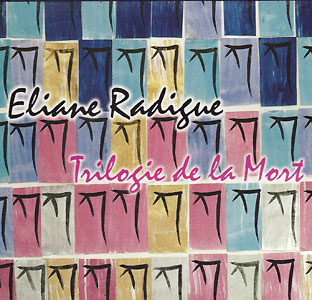
 |
|
 |
Format: 3xCD-Box Label & Cat.Number: Experimental Intermedia Foundation XI 119 Release Year: 1998 Note: three very contemplative / meditative / minimal drone-works (all from the 80's / 90's) inspired by the 'Bardo-Thödol' , the Tibetan 'Book of the Dead'; => one of her most fascinating & esoteric works, comes with extensive booklet - "The slowly changing timbres create quite physical resonances and density modulations, suggesting encounters with traveling personalities, some comforting, some evoking deep and strange spirits." [All Music com] BACK IN STOCK
Price (incl. 19% VAT): €30.00 Warning: Currently we do not have this album in stock!
More InfoDie epische Drone-Trilogie der französischen Komponistin, die bei PIERRE SCHAEFFER und PIERE HENRY studiert hat und zum tibetanischen Buddhismus übergetreten ist.... tief esoterisch und versunken, vom Bardo Thodol inspiriert.."Trilogie de la Mort is a work in three parts. The first, Kyema was originally released by XI in 1990, but now, with the recording of Kailasha and Koumé, the trilogy makes its debut in its entirety. Kyema is inspired by the texts of Bardo-Thodol (The Tibetan Book of the Dead), and invokes the six intermediate states that constitute the existential continuity of the being. Kailasha, the second chapter, is structured on an imaginary pilgrimage around Mt. Kailash, one of the most sacred mountains in the Himalayas. Koumé, makes up the last part of the trilogy and emphasizes the transcendence of death." [label description] Included is a booklet with extensive liner-notes ! www.xirecords.org "This profound work of electronic music on three CDs is based on the composer's complete immersion in Tibetan Buddhist teaching, and takes its title from Thomas Merton's Trilogy on Death: "Going beyond death in this life, beyond the dichotomy of life and death, and so to become a witness to life itself." The first "chapter" is "Kyema," composed during the years 1985-1988. It was inspired by texts of the Bardo-Thödol (a book of the dead) and "evokes the six intermediate states which constitute the 'existential continuity' of being: Kyene (birth), Milam (dream), Samtem (contemplation and meditation), Chikai (death), Chönye (clear light), and Sippai (crossing and return)." The slowly changing timbres create quite physical resonances and density modulations, suggesting encounters with traveling personalities, some comforting, some evoking deep and strange spirits. "Kyema" is dedicated to the composer's son Yves Arman, who passed away in a car accident shortly before its completion. The second chapter, "Kailasha" (1988-1991), is "an imaginary journey around the most sacred of the Himalayan mountains, Mount Kailash," but since the mountain is considered a "natural mandala," the work also attempts to recreate the illusion found in works of visual artists Albers and Escher, where one perspective overlaps and flips over into another, involuntarily. The composer considers "Kailasha" to be "the most chaotic part of the trilogy" and deeply unnerving. "Koumé," the third chapter, emphasizes the transcendence of death. The title of "Koumé"'s fourth subsection quotes the Bible in Corinthians XV ("O Death, where is thy victory?"): "Ashes of illusion becoming light. Descent to the deepest, where the spark of life is. There, Death is born. Death becomes birth. Actively re-beginning. Eternity -- a perpetual becoming." [AllMusic] |
| © 2007 Drone Records | | Celler Strasse 33, 28205 Bremen, Germany | Privacy and cookies policy | Impressum / Allgemeine Geschaftsbedingungen / Haftungsausschluss | Links to the scene |